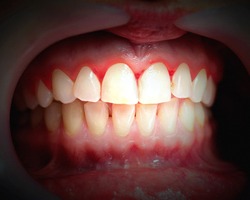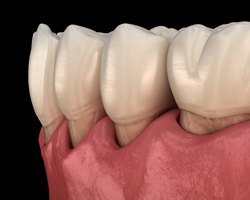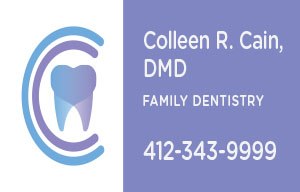Periodontal Therapy
Deep Cleaning for Healthy Gums
Nearly half of adults in the United States have some kind of gum disease, but many of them may not even realize it until severe damage has already been done. Fortunately, Dr. Colleen can help treat a gum infection at its source with a deep cleaning, which can make all the difference in letting you save your teeth. If you’re concerned that you might be showing signs of gum disease in Castle Shannon, get in touch with us right away.
What is Gum Disease?

Your mouth provides the perfect environment for bacteria to thrive. If the bacteria in plaque start to build up, they could infect your gums; this is what’s known as gum disease (or periodontal disease). The earliest stage is known as gingivitis, and while there may be some inflammation and bleeding at this point, the damage is not irreversible. However, untreated gingivitis eventually becomes periodontitis, which causes the inner layer of the gum and bone to pull away from your teeth, forming pockets that can easily become infected. As the disease becomes more severe, the pockets deepen, and the gum tissue and bone holding your teeth in place are destroyed. You could ultimately lose your teeth altogether.
In addition to devastating your oral health, gum disease has also been linked to diabetes, Alzheimer’s, heart disease, stroke, and low-birth rate babies.
Common Symptoms of Gum Disease

Unfortunately, recognizing gum disease in its earliest stages (when it’s easier to treat) can be challenging because symptoms often don’t appear until the infection has become more severe. Your best bet is to visit a dentist in Castle Shannon twice a year for a checkup. However, there are several symptoms that could point to a problem with your gums:
- Redness, swelling, and tenderness in the gums
- Bleeding whenever your brush or floss, or when you bite down on hard food
- Bad breath that doesn’t go away
- Mouth sores or other kinds of oral pain
- Teeth that have become loose or are starting to separate
- Pus between the gums and teeth
- Gum recession
- Bite changes
Schedule an appointment right away if you notice any of these warning signs; any one of them could potentially point to a severe oral health problem on their own.
Scaling and Root Planing

